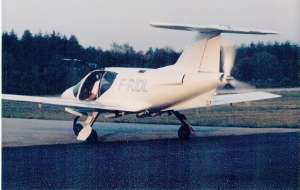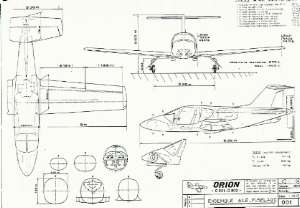|
PECULIARITIES 0F THE DESIGN CONFIGURATION:
- Better propeller
efficiency - The high speed airflow behind the propeller is not obstructed by a bulky
fuselage. The propeller fan effect which is destabilizing on a conventional aircraft is stabilizing
on a
pusher
of this
configuration.
- Reduction in fuselage drag - The fuselage can be given a cleaner aerodynamic shape. It is not in an
accelerated helicoïdal airflow behind a propeller. These two factors
contribute to a significant drag reduction.
- Noise
reduction - For the reasons given above, the wind noise
perceived
in the
cabin
is lessened. On the
other
hand, the engine,
located
behind the cabin can be
more
effectively
sound-proofed; therefore, it is
less noisy
for the crew
and passengers.
- Very good visibility - The wing is behind the cabin and the forward part
of the fuselage is well glazed, offering excellent
visibility.
- Convenient engine location - The location of the engine, very close to the aircraft C.G. makes it possible to easily adapt many types of engines with only minor airframe modification and without drastic C.G. shift.

Photo Geoff Jones
- Main load structures grouped together- All main components are grouped at the center of
the aircraft: Engine, transmission, wing attachments, main landing gear.
- Fuel
economy - Lower fuel consumption is attained as a result of better propeller efficiency and cleaner aerodynamics.
- Aesthetics - Jet aircraft look.
The engine/propeller configuration requires a few remarks
regarding the aircraft
operation.
There is very little torque reaction to be corrected with the rudder when changing engine power output. This feature facilitates control of the aircraft, especially at take-off and when overshooting.
The tail control surfaces are free from propeller
slipstream effects: therefore, they do not feel any of the secondary perturbations which are common with tractor configurations. However,
take-off and approach speeds are somewhat higher but the risk of premature take-off is practically eliminated.

Top of
Page
| 

